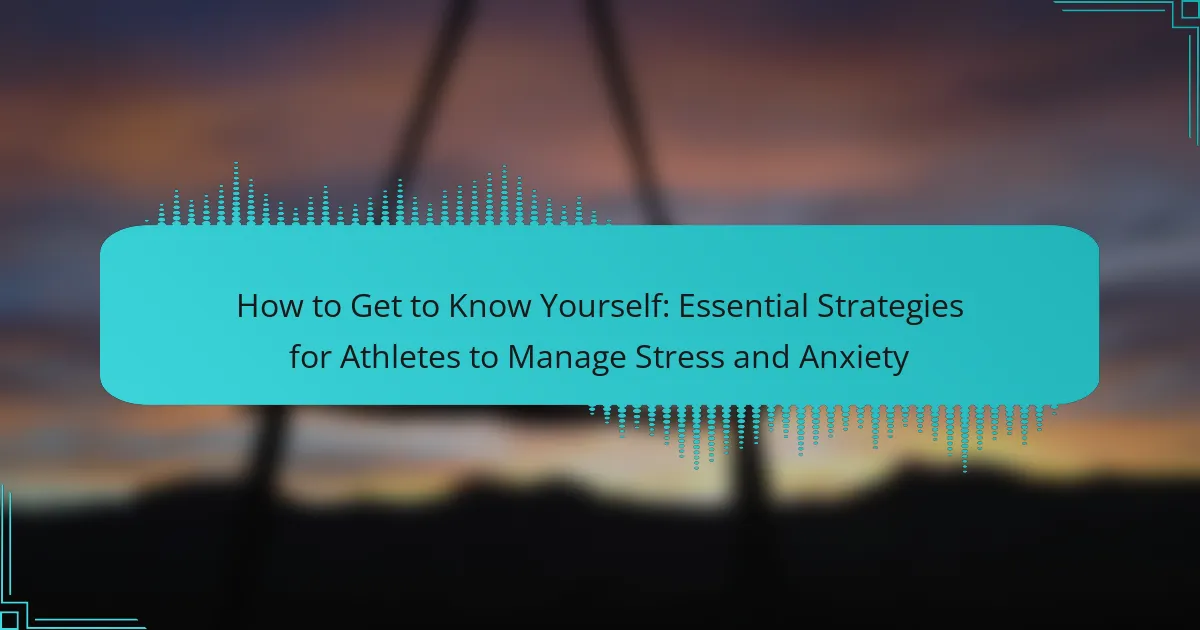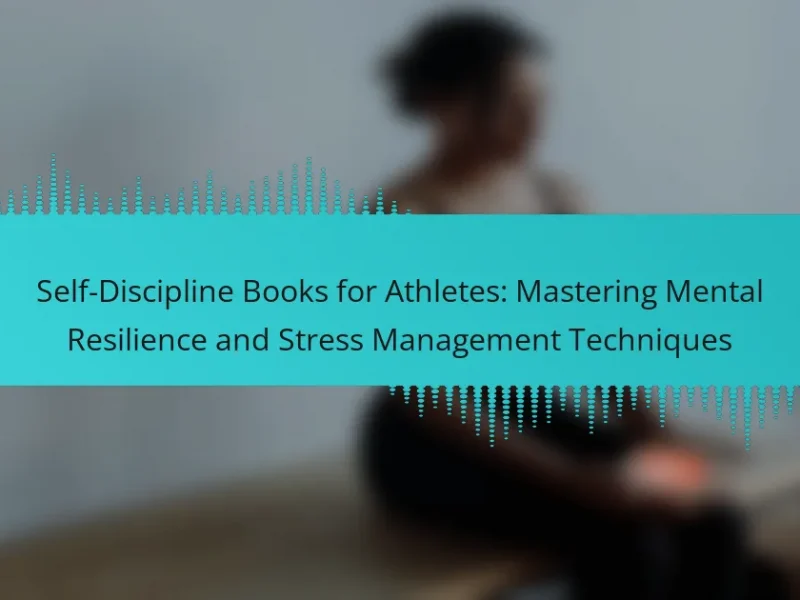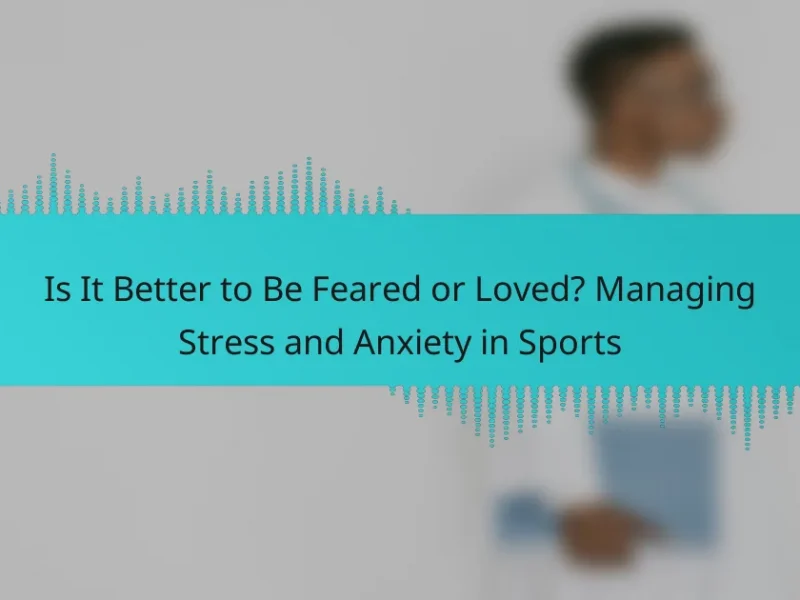Understanding yourself is crucial for athletes to manage stress and anxiety effectively. This article explores essential strategies such as mindfulness practices, reflective journaling, and goal setting. It highlights the importance of seeking mentorship and feedback for personal growth. By deepening self-awareness, athletes can enhance their performance and emotional resilience.
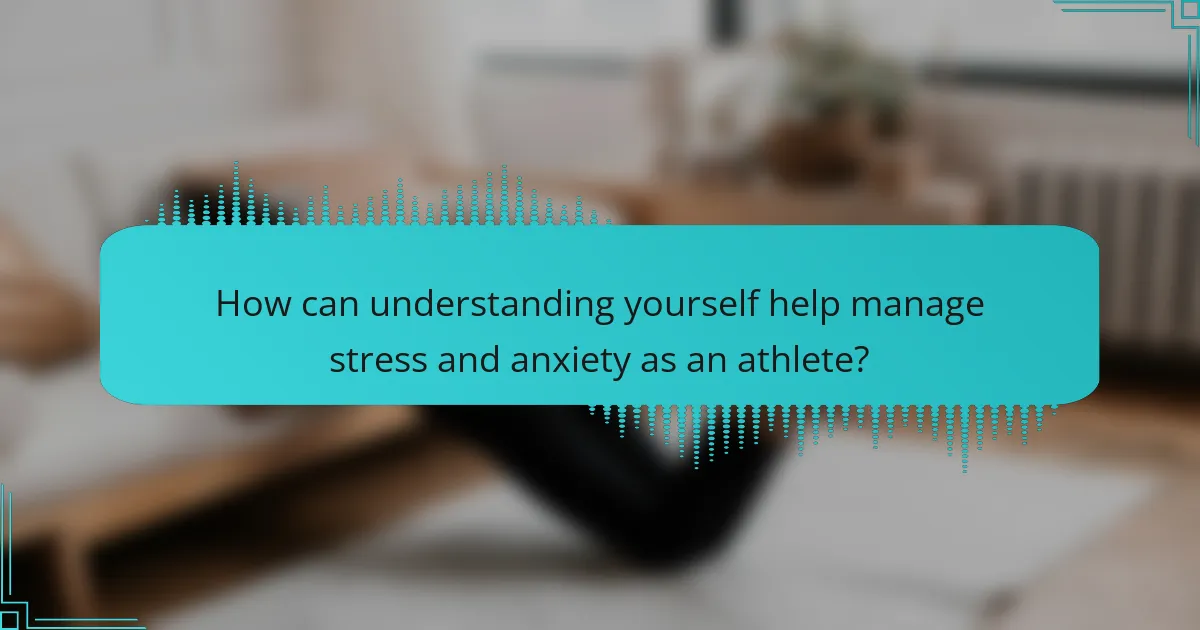
How can understanding yourself help manage stress and anxiety as an athlete?
Understanding yourself enhances stress and anxiety management for athletes by promoting self-awareness and tailored coping strategies. Self-reflection helps identify triggers, enabling athletes to develop personalized approaches. Techniques like journaling or mindfulness foster emotional regulation, leading to improved performance under pressure. Recognizing strengths and weaknesses allows for focused training and mental resilience. Ultimately, deeper self-knowledge cultivates confidence, reducing anxiety during competitions.
What are the common sources of stress and anxiety for athletes?
Athletes commonly experience stress and anxiety from performance pressure, injury concerns, and competition-related fears. These factors can significantly impact mental well-being. Performance pressure stems from expectations set by coaches, peers, and oneself. Injury concerns create anxiety about physical health and future participation. Competition-related fears often involve outcomes and comparisons with others. Addressing these sources is essential for effective stress management.
How does self-awareness contribute to better performance?
Self-awareness enhances performance by allowing athletes to recognize their strengths and weaknesses. This understanding leads to better stress management and anxiety reduction. Athletes who practice self-reflection can set realistic goals, improving focus and motivation. Research shows that self-aware individuals are more adaptable, enabling them to respond effectively to challenges.

What are the universal strategies for self-discovery among athletes?
Athletes can utilize universal strategies for self-discovery to effectively manage stress and anxiety. Key approaches include mindfulness practices, setting personal goals, engaging in reflective journaling, and seeking mentorship.
Mindfulness practices help athletes remain present, reducing anxiety by focusing on the moment. Setting personal goals provides a clear direction, increasing motivation and self-awareness. Reflective journaling allows athletes to process experiences and emotions, fostering deeper self-understanding. Seeking mentorship offers guidance and support, enhancing personal growth through shared experiences.
These strategies not only promote self-discovery but also improve overall performance and mental well-being.
How can journaling enhance self-reflection?
Journaling enhances self-reflection by providing a structured way to process thoughts and emotions. This practice allows athletes to articulate their experiences, fostering greater self-awareness and clarity. Regular journaling can reveal patterns in behavior and stress triggers, enabling targeted strategies for managing anxiety. Moreover, it serves as a valuable tool for tracking progress and setting goals, ultimately enhancing performance and mental resilience.
What prompts can be used for effective journaling?
Effective journaling prompts for athletes include reflection on daily experiences, emotions, and goals. Consider these prompts: What challenges did I face today? How did I manage my stress? What strategies helped me perform better? What are my short-term and long-term goals? How can I improve my mental resilience? These prompts encourage self-awareness and enhance stress management skills.
What role does goal-setting play in self-awareness?
Goal-setting enhances self-awareness by providing clarity on personal values and priorities. It allows athletes to reflect on their motivations and track progress. By setting specific, measurable goals, athletes can identify strengths and areas for improvement. This process fosters a deeper understanding of their abilities and mental state, ultimately aiding in stress and anxiety management.
How can SMART goals be applied for personal development?
SMART goals can enhance personal development by providing a structured framework. Specific goals clarify focus, measurable criteria track progress, achievable targets ensure realism, relevant objectives align with personal values, and time-bound deadlines create urgency. For athletes, applying SMART goals can reduce stress by breaking down larger ambitions into manageable steps, promoting confidence through achievable milestones, and enhancing motivation by celebrating small successes. This structured approach fosters self-awareness and encourages continuous improvement.
How can seeking feedback improve self-knowledge?
Seeking feedback enhances self-knowledge by providing external perspectives on behavior and performance. This insight helps athletes identify strengths and weaknesses, fostering personal growth. Regular feedback encourages reflection, leading to better self-awareness and emotional regulation. Consequently, athletes can manage stress and anxiety more effectively by understanding their triggers and responses.

What unique methods can athletes use to deepen self-understanding?
Athletes can deepen self-understanding through mindfulness practices, journaling, and seeking feedback. Mindfulness enhances awareness of thoughts and feelings, promoting better emotional regulation. Journaling allows athletes to reflect on experiences, identify patterns, and clarify goals. Seeking feedback from coaches or peers provides external perspectives, fostering growth and self-awareness. These methods uniquely empower athletes to manage stress and anxiety effectively.
How can visualization techniques aid in self-discovery?
Visualization techniques enhance self-discovery by allowing athletes to explore their thoughts and emotions. These techniques foster clarity, enabling athletes to identify personal strengths and weaknesses. By visualizing goals, athletes can create a mental roadmap, reducing anxiety and stress. Engaging in regular visualization promotes a deeper understanding of self, leading to improved performance and mental resilience.
What is the impact of personality assessments on athlete self-awareness?
Personality assessments significantly enhance athlete self-awareness by providing insights into individual strengths and weaknesses. These tools help athletes identify their emotional responses, motivations, and stress triggers. As a result, athletes can develop tailored strategies to manage stress and anxiety effectively. Research indicates that athletes who engage with personality assessments report improved mental resilience and performance consistency. By understanding their personality traits, athletes can foster a more positive mindset and optimize their training approaches.
Which assessments are most beneficial for athletes?
Physical assessments, psychological evaluations, and performance metrics are most beneficial for athletes. These assessments help identify strengths, weaknesses, and areas for improvement, ultimately aiding in stress and anxiety management.
Physical assessments include fitness tests, body composition analysis, and flexibility evaluations. Psychological evaluations often involve questionnaires or interviews to gauge mental resilience and coping strategies. Performance metrics track progress in skills, endurance, and overall performance.
Utilizing these assessments provides athletes with a comprehensive understanding of their capabilities, ensuring tailored strategies for effective stress and anxiety management.

What are the rare insights athletes can gain through self-exploration?
Athletes can gain rare insights through self-exploration by understanding their emotional triggers and identifying unique coping mechanisms. This process fosters resilience, enhances self-awareness, and promotes mental clarity. Engaging in reflective practices, such as journaling or meditation, allows athletes to recognize patterns in their stress responses. As a result, they can develop tailored strategies that improve performance and well-being.
How can mindfulness practices uniquely benefit athletes?
Mindfulness practices uniquely benefit athletes by enhancing focus, reducing stress, and improving overall performance. These techniques cultivate mental resilience, enabling athletes to manage anxiety effectively during competitions. Research indicates that mindfulness can lead to a 20% increase in performance metrics by improving concentration and emotional regulation. Athletes who engage in mindfulness report greater satisfaction and reduced burnout, showcasing its unique attributes in fostering mental well-being.
What uncommon activities can facilitate deeper self-connection?
Engaging in uncommon activities like forest bathing, breathwork, or art therapy can significantly enhance self-connection. These practices allow athletes to explore emotions, reduce stress, and foster mindfulness. Forest bathing immerses individuals in nature, promoting relaxation and introspection. Breathwork techniques help in regulating emotions and enhancing focus. Art therapy encourages self-expression, revealing inner thoughts and feelings. Each activity uniquely contributes to a deeper understanding of oneself, essential for managing stress and anxiety effectively.
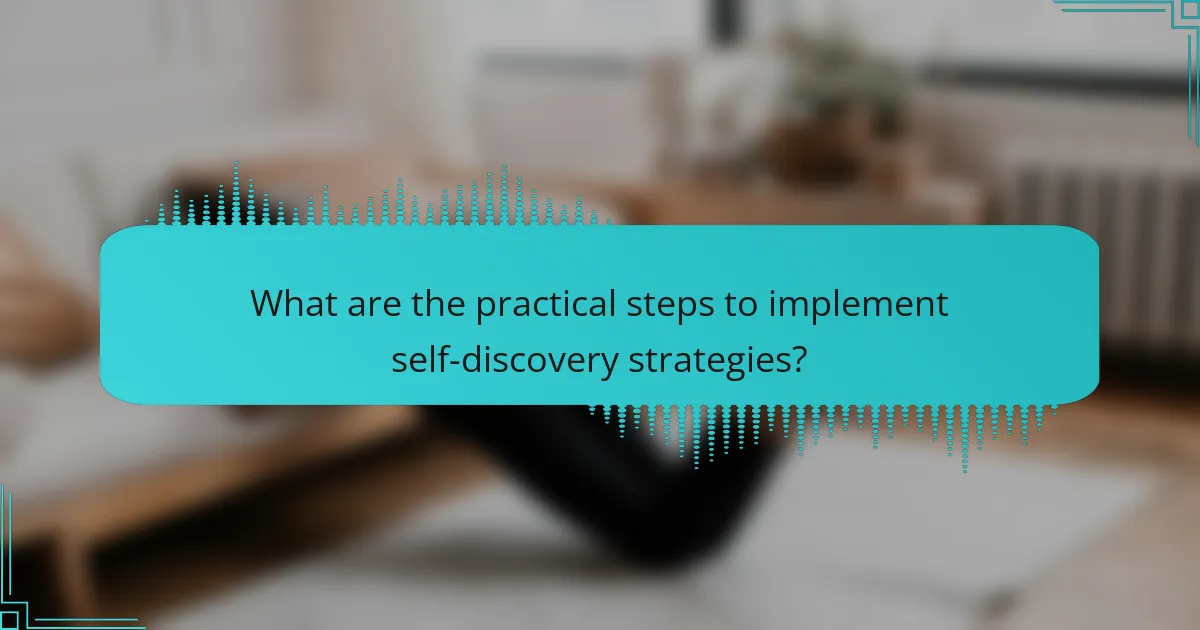
What are the practical steps to implement self-discovery strategies?
To implement self-discovery strategies, athletes should follow these practical steps. First, allocate time for reflection through journaling or meditation. This helps clarify thoughts and emotions. Second, set specific goals for personal growth, focusing on areas like stress management and emotional resilience. Third, engage in regular physical activities that promote mindfulness, such as yoga or tai chi. These practices enhance self-awareness and reduce anxiety. Lastly, seek feedback from trusted coaches or peers to gain different perspectives on personal strengths and areas for improvement.
How can athletes create a personalized self-reflection routine?
Athletes can create a personalized self-reflection routine by setting specific times for reflection, using guided journals, and incorporating mindfulness practices. This routine helps athletes manage stress and anxiety effectively.
1. Schedule regular reflection sessions, ideally post-training or competition.
2. Utilize guided journals to prompt deeper insights into performance and emotions.
3. Engage in mindfulness practices, such as meditation or breathing exercises, to enhance self-awareness.
4. Review goals and progress regularly to adjust strategies and maintain motivation.
What common mistakes should athletes avoid in their self-exploration journey?
Athletes should avoid overthinking, neglecting self-care, comparing themselves to others, and ignoring their emotions. These mistakes can hinder their self-exploration journey and exacerbate stress and anxiety. Recognizing and addressing these pitfalls is essential for personal growth and mental well-being.
What expert tips can enhance the effectiveness of self-discovery methods?
To enhance the effectiveness of self-discovery methods, athletes should adopt structured reflection and mindfulness practices. These techniques foster deeper self-awareness and emotional regulation.
Incorporating journaling can clarify thoughts and feelings, while meditation promotes focus and reduces anxiety. Setting specific goals for self-discovery can create a roadmap for personal growth. Engaging in feedback sessions with coaches or peers provides external perspectives, enriching the self-discovery process.
Lastly, maintaining a consistent routine for these practices amplifies their benefits, leading to improved stress management and overall performance.
